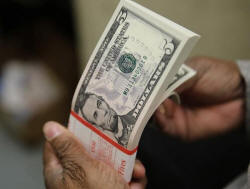|
Dollar stumbles after
Trump advisor quits, eyes on Yellen
 Send a link to a friend
Send a link to a friend
 [February 14, 2017]
By Yumna Mohamed [February 14, 2017]
By Yumna Mohamed
LONDON
(Reuters) - The dollar stumbled against major currencies on Tuesday as
investors reined in any expectations for a March rise in U.S. interest
rates and U.S. President Donald Trump's national security advisor
Michael Flynn quit in a row over Russia.
The euro inched up by 0.2 percent and the yen gained around a third of a
percent in morning trade in Europe, while sterling was the biggest mover
- down more than half a percent after lower-than-expected inflation
numbers.
That all pushed the dollar index back from three-week highs, down just
over 0.2 percent after Flynn's resignation added to a week which has
seen Trump change tack or soften his message on a number of foreign
policy fronts.
Investors worry that points to a less cohesive White House that may
struggle to implement the promises of "phenomenal" tax reform and public
investment that sent the dollar and U.S. stock markets spiraling higher
after Trump's elections.
The prospect of a surge in inflation has spurred expectations of rises
in U.S. Federal Reserve interest rates this year. But any expectations
of one next month have been trimmed ahead of Fed chief Janet Yellen's
testimony in Congress on Tuesday.

"We’re still early into the new administration so we’re yet to get
details of fiscal strategy and that’s going to have an important impact
on how the Fed guides policy," said Simon Derrick, chief market
strategist with BNY Mellon in London.
The euro rebounded over 0.7 percent against sterling after the latter
was hit by weaker-than-expected inflation data that added to some recent
worrying numbers for the British economy.
Consumer prices rose at the fastest pace since June 2014 last month,
driven by higher global oil prices and the Brexit vote-fueled fall in
the pound's value, the official data showed.
But possibly as much of a concern going forward will be the sharp rises
in costs which British producers are having to swallow due to rising
world oil prices and the 20 percent slump in sterling over the past
year.
[to top of second column] |

A packet of former U.S. President Abraham Lincoln five-dollar bill
currency is inspected at the Bureau of Engraving and Printing in
Washington March 26, 2015. REUTERS/Gary Cameron/File Photo

That comes at a time when political risk is also beginning to weigh on
the euro. There were also worrying dips in German growth data and
sentiment surveys on Tuesday.
"The euro is being propped up by real weakness in the pound which is
allowing it to maintain its gains against the U.S. dollar," said
Kathleen Brooks, research director at City Index.
"While the weaker pound is helping to lift the euro, we also saw weak
data out of the euro zone today which might show that the European
recovery story has hit the skids," she said.
The euro, which has come under pressure in recent sessions from France's
presidential election campaign and Greek bailout talks, benefited from
dollar weakness and was up 0.2 percent at $1.0616.
Dallas Federal Reserve Bank President Robert Kaplan, a voter this year
on the Fed's policy-setting panel, said on Monday in remarks prepared
for posting to the Dallas Fed website that the U.S. central bank should
act soon to raise rates or risk having to abandon its plan to do so
slowly.
However, interest rate futures show investors pricing in less than a 1
in 6 chance the Fed will increase rates at its meeting next month,
according to CME Group's FedWatch program.
(Reporting by Yumna Mohamed; Editing by Angus MacSwan)
[© 2017 Thomson Reuters. All rights
reserved.] Copyright 2017 Reuters. All rights reserved. This material may not be published,
broadcast, rewritten or redistributed.
 |